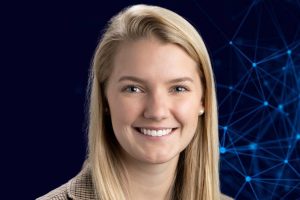
From apps and face recognition to Google searches and GPS, artificial intelligence (AI) has become an integral part of many people’s daily lives. Despite its usefulness, there are growing concerns about the effect of biases embedded in the algorithms powering our AI systems, resulting in skewed and unfair results and predictions.
A data scientist at the Johns Hopkins University Applied Physics Laboratory, Alexandra Stephens MS ’19 is developing a tool that not only identifies when bias happens, but also evaluates whether or not it is the result of chance.
“We define ‘bias’ as a difference in performance between two or more subpopulations, which could include protected groups. We use statistical hypothesis testing to determine whether a difference in performance is due to random chance or indicates that an algorithm is biased. This tells us if the difference is ‘meaningful’,” said Stephens, a graduate of the Department of Applied Mathematics and Statistics’ dual bachelor’s/master’s degree program.
Once bias is statistically determined, Stephens works on developing software tools to help her colleagues retrain the algorithms in question using cognitive bias mitigation strategies.
“Identifying bias is critical in sensitive domains where you may be impacting a group of people. Consider an algorithm that predicts the likelihood of someone committing a crime again, but the algorithm used to generate this result is ultimately biased. When people put their trust in a blackbox algorithm rather than a trained human, it can have a negative impact on the lives of others,” said Stephens.
Shortly after beginning her career at APL, Stephens was called to be part of a COVID-19 response team, analyzing emergency room and case data and developing metrics to characterize the state of the pandemic across US geographical regions. This helped inform federal decision-making about how best to allocate scarce supplies.
This role later evolved into generating analytic reports on COVID-19 cases and deaths using an automated Python pipeline, which is a growing open-source programming language for engineers. In that role, Stephens used software engineering skills learned in a Whiting School of Engineering data mining course taught by Tamás Budavári, an associate professor of applied mathematics and statistics, to create reports and graphs used by senior U.S. government leaders and other relevant stakeholders.
“Professor Budavári introduced us to the use of Python to complete data science tasks. I furthered this skill at an internship, specifically with data analysis and plotting Python packages. This was very applicable to my time on the COVID-19 response team where we had to rapidly analyze and visualize COVID-19 data to quickly make sense of the pandemic and inform resource allocation and other decisions,” said Stephens.
Other courses that she took at Johns Hopkins that she considers particularly noteworthy in terms of equipping her with skills she uses in her role at APL include Financial Computing, taught by Daniel Naiman, a professor of applied mathematics and statistics, and Optimization I and II, taught by Donniell Fishkind, an associate research professor of applied mathematics and statistics.
“In those classes, I used MATLAB to solve optimization problems for the first time and I also was able to do research with Dr. Fishkind building baseball schedules with optimization which strengthened my software skills,” Stephens said.
She says that the integration of software with mathematical theory and the use of code to solve math problems in these courses were so enjoyable and challenging that they sparked her interest in learning more.
She looks forward not only to continuing to hone her coding skills and software techniques at APL, but also to assisting others in creating code bases that are accessible and simple to use.
“Math will always be my first love, but math alone can’t solve these big, real-world problems. I’m always grateful that I studied applied mathematics at Hopkins because it provided me with a solid theoretical foundation as well as the practical ability to implement a solution,” said Stephens.